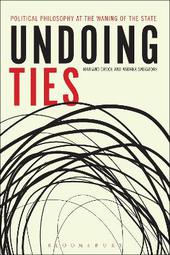
|
Undoing Ties: Political Philosophy at the Waning of the State
Hardback
Main Details
| Title |
Undoing Ties: Political Philosophy at the Waning of the State
|
| Authors and Contributors |
By (author) Mariano Croce
|
|
By (author) Andrea Salvatore
|
| Physical Properties |
| Format:Hardback | | Pages:192 | | Dimensions(mm): Height 216,Width 140 |
|
| Category/Genre | Social and political philosophy |
|---|
| ISBN/Barcode |
9781628922035
|
| Classifications | Dewey:320.01 |
|---|
| Audience | | Undergraduate | | Postgraduate, Research & Scholarly | |
|---|
|
Publishing Details |
| Publisher |
Bloomsbury Publishing Plc
|
| Imprint |
Bloomsbury Academic USA
|
| Publication Date |
16 July 2015 |
| Publication Country |
United States
|
Description
Undoing Ties claims to offer an answer to the question of what happens when the ties between traditional political institutions and citizens are being undone. The basic aim of the book is to offer an introductory and accessible overview of those paradigms and theories that are specifically concerned with the irreducible plurality of life forms and seek to understand how this challenge should be faced. The authors adopt an interdisciplinary approach to foreground how scholars in different areas (such as political philosophy, jurisprudence, sociology and anthropology) deal with one of the key characterizing elements of today's political scenario, that is to say, the reviviscence of sub-state and supra-state groups as crucial political actors vis-a-vis the state.
Author Biography
Mariano Croce is FWO Pegasus Marie Curie Fellow at the Centre for Law and CosmopolitanValues, University of Antwerp. He has published Self-sufficiency of Law: A Critical-institutional Theory of Social Order (Springer, 2012) and The Legal Theory of Carl Schmitt (Routledge, 2013, with A. Salvatore). Andrea Salvatore is Post-Doctoral Research Fellow of Political Philosophy at Sapienza - University of Rome. His research interests lie in the areas of political philosophy and legal theory. He is the co-author of The Legal Theory of Carl Schmitt (Routledge 2013, with M. Croce).
ReviewsUndoing Ties by is an impressive, thorough study of an enormously profound, contemporary development that is having, and will continue to have, disruptive and politically important consequences for both politics and political philosophy. * The European Legacy * The territorial state has been the most successful political innovation of the modern age up to the point to cover all emerged surface of the planet. But it is increasingly unable to represent the political needs of the XXI Century. In this fascinating reconstruction, Croce and Salvatore show with passion and competence how markets and civil society, individuals and ethnic groups are more and more discontent with what the state provides. And, more importantly, they indicate what alternative forms of political organization are emerging. * Daniele Archibugi, Professor, Birkbeck College, University of London, UK * This book attempts to answer a pivotal question: what happens to political theory now that the ties between state and citizens are being undone? The answer, at least at first impression, is offered with remarkable modesty: an approachable and contained overview of political theory with regards to the conditions of the transition. Yet, any apparent modesty is quickly belied, first, by the ambitious interdisciplinarity of the venture, with learned insights from jurisprudence, philosophy, sociology and anthropology, and second, by the astonishing depth of original analysis contained here while never amounting to anything short of approachable. So if you thought you knew your Rawls, Sen, Beck, read this book and think again. The feat of Undoing Ties is to provide both an original overview and an elaborate new perspective on citizenship beyond the state. This is not an ordinary book of political theory but an erudite disquisition on the conditions of transition, a subtle questioning of such important issues as structural violence, cultural and legal pluralism, supranational justice, and global poverty, and an imaginative foray into what might happen next. * Andreas Philippopoulos-Mihalopoulos, Professor of Law & Theory, University of Westminster, UK *
|